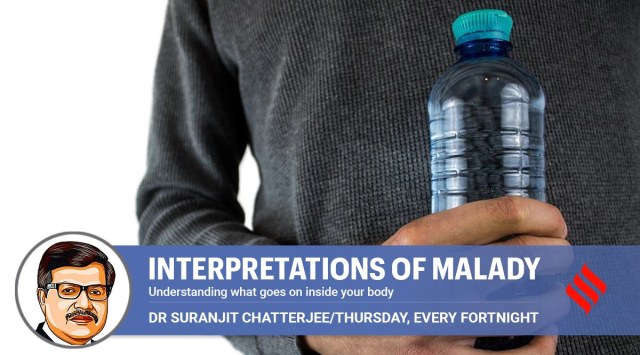How much water does your body need? What’s silent dehydration?
A recent study found that 75 per cent Indians are dehydrated to some degree. Do not get tempted by artificial juices and fizzy drinks in summer, sip small amounts of water through the day instead, says Dr Suranjit Chatterjee, Senior Consultant, Internal Medicine, Indraprastha Apollo Hospital, New Delhi
 Dehydration occurs when the body loses more fluid than it takes in (Source: Pixabay)
Dehydration occurs when the body loses more fluid than it takes in (Source: Pixabay) Silent dehydration is a condition that affects millions of people worldwide. This is especially true in India, where dehydration is a common occurrence due to the hot and humid climate. Many people, however, are not aware of the symptoms of dehydration and may not realize that they are suffering from it.
Dehydration occurs when the body loses more fluid than it takes in. This can happen due to a variety of factors, including excessive sweating, diarrhoea, vomitting, and not drinking enough water. When the body loses water, it also loses important electrolytes like sodium, potassium, and chloride. These electrolytes are important for proper cell function, and their loss can lead to serious health problems.
One of the biggest challenges with dehydration is that the symptoms can be subtle, and many people may not realize that they are dehydrated until it is too late. Some common symptoms of dehydration include thirst, dry mouth, fatigue, and headache. In more severe cases, dehydration can cause dizziness, confusion, rapid heartbeat, and even seizures.
In India, where the climate is hot and humid for most of the year, dehydration is a common problem. In fact, a recent study found that up to 75 per cent of Indians are dehydrated to some degree. This is particularly true for people who live in rural areas, where access to clean drinking water may be limited.
One of the biggest challenges with silent dehydration is that it can affect anyone, regardless of age or health status. Children and the elderly are particularly susceptible to dehydration, as are people who engage in strenuous physical activity or who are exposed to hot temperatures for extended periods of time.
Fortunately, there are steps that you can take to prevent dehydration. The most important thing is to drink plenty of water throughout the day. Experts recommend drinking at least 8-10 glasses of water per day, but this can vary depending on your age, weight, activity level and health status. It’s also a good idea to avoid sugary drinks and alcohol, which can actually dehydrate you further. You may be tempted to have fizzy drinks and artificial juices in summer but these contain sugar, dehydrating you further. If you are not one of those concerned about their water intake, try sipping small amounts through the day to keep you on an even keel.
Another important step in preventing dehydration is to be aware of the signs and symptoms of dehydration. If you start to feel thirsty, have a dry mouth, or experience fatigue or headache, it’s important to start drinking water immediately. You can also eat foods that are high in water content, such as fruits and vegetables, to help keep you hydrated.
In addition to drinking plenty of water, it’s important to replace any electrolytes that you may have lost due to dehydration. This can be done by drinking sports drinks or by eating foods that are high in electrolytes, such as bananas, avocados, and leafy greens.
If you suspect that you are suffering from dehydration, it’s important to seek medical attention right away. In severe cases, dehydration can lead to serious health complications, including kidney failure and even death. Your doctor can help you determine the best course of treatment, which may include intravenous fluids and electrolyte replacement.
It is important to note that if you are suffering from cardiac ailments, kidney and liver dysfunction, the amount of fluid intake should be guided by the treating physician.



- 01
- 02
- 03
- 04
- 05




























